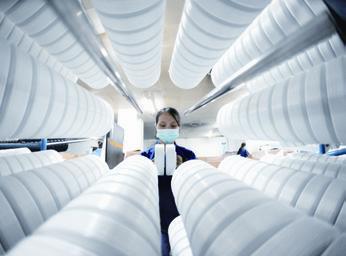Economy on the Track of Recovery

Chinas factory output and services sector continued to expand in June as a slew of supportive policies took effect, offi cial data showed on June 30.
The purchasing managers index (PMI) for the manufacturing sector ticked up to 50.9 in June from 50.6 in May, the National Bureau of Statistics (NBS) said.
A reading above 50 indicates expansion, while a reading below refl ects contraction.
Wen Bin, chief analyst at China Minsheng Bank, attributed the growth to the positive trend in nationwide epidemic control, improvements in both supply and demand and counter-cyclical adjustment policies that are paying off.
China has been walking a fine line in balancing epidemic control and economic recovery, with targeted measures to help fi rms safely restart their businesses.
The PMI for 14 of the 21 surveyed manufacturing sectors registered a reading above 50, an increase of 5 points from May, the data showed.
The sub-index for production edged up 0.7 point to 53.9 in June. The sub-index for new orders picked up 0.5 point to 51.4, rising for two consecutive months.
The PMI for large- and medium-sized enterprises stood at 52.1 and 50.2, respectively, while that for small fi rms slid 1.9 points to 48.9, indicating that for the time being smaller businesses are encountering diffi culties, Wen said.
As major global economies resumed business successively, external demand recovered but remained sluggish, with the sub-index measuring new export orders increasing 7.3 points to 42.6.
The indices measuring raw material purchase prices and factory-gate prices rebounded by 5.2 and 3.7 points, respectively, both reaching the highest level recorded in the past six months.
Although the sub-index gauging firmsexpectations for business activities slightly declined to 57.5, manufacturing firms remained sanguine about market recovery in the near future, NBS senior statistician Zhao Qinghe said.
The data released on June 30 also showed that the PMI for the non-manufacturing sector rose 0.8 point to 54.4 in June, growing for the fourth straight month.
In breakdown, the sub-index for business activities in the construction sector came in at 59.8, above 59 for three months in a row, and that for the service sector rose 1.1 points to 53.4.
As the restoration of production and normal life accelerated, market confi dence was enhanced and demand in the service sector continued to grow, according to Zhao.
Zhang Liqun, a researcher with the Development Research Center of the State Council, said the PMI expansion above the boom-bust line signals that the countrys economic recovery is accelerating.
However, some service sectors are still facing difficulties in recovering, as the subindices for business activities in culture, sports and entertainment areas are below the 50-point mark, Zhao said.
As the monetary and fi scal policies implemented earlier take effect, the performance of the manufacturing sector will be promising in the next half year, Wu Chaoming, Vice President of the research institute of Chasing Securities, said.
“The Chinese economy has been in the process of recovery since March, and the economic indicators have shown some improvements, which is mainly because the novel coronavirus outbreak is basically contained in China,” Ding Shuang, chief economist for Greater China and North Asia at Standard Chartered, the British banking corporation, said.
Ding forecast that Chinas GDP will likely to grow by about 3 percent year on year in the second quarter.

